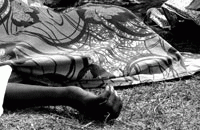The mainstream press has been all over the senseless and tragic killing of four mountain gorillas in the Democratic Republic of Congo. But, no one has yet reported an important release from the United Nations’ Mission to DR Congo (MONUC) that there have been 4,500 cases of sexual violence against women and children in the first six months of this year in South Kivu Province alone.
According to Prof. Yakin Ertürk, Special Rapporteur of the United Nations Human Rights Council on Violence against Women “the situation in the Kivus is the worst crisis I have encountered so far.” Professor Ertürk denounced this situation during the conference in Kinshasa on 27 July 2007, according to MONUC reports.
The following is verbatim testimony from Prof. Ertürk, and speaks for itself:
“The real number of cases is certainly many times higher as most victims live in inaccessible areas, are afraid to report or did not survive the violence.
“Most of the sexual violence in South Kivu is reportedly perpetrated by foreign non-state armed groups. A number of their members appear to have been implicated in the Rwandan genocide and subsequently fled to the DRC. Operating from forest areas, these armed groups raid local communities, pillage, rape, sexually enslave women and girls and subject them to forced labour.
“The atrocities perpetrated by these armed groups are of an unimaginable brutality that goes far beyond rape. The atrocities are structured around rape and sexual slavery and aim at the complete physical and psychological destruction of women with implications for the entire society. They are in many ways reminiscent of those committed by the Interahamwe during the Rwandan genocide.
“Women are brutally gang raped, often in front of their families and communities. In numerous cases, male relatives are forced at gun point to rape their own daughters, mothers or sisters. Frequently women are shot or stabbed in their genital organs, after they are raped. Women, who survived months of enslavement, told me that their tormentors had forced them to eat excrements or the human flesh of murdered relatives.
“The Panzi Hospital, a specialized institution in Bukavu (South Kivu), receives annually about 3500 cases of women who suffer fistula and other severe genital injuries resulting from these sexualized atrocities. I spoke with a 10-year old girl at the hospital, who had been abducted together with her parents. She had to have an emergency operation, because the perpetrators had rammed a stick into her genital organs.
“The FARDC has so far proven to be unable to stop the atrocities in South Kivu, which have been raging for several years. The international community, in collaboration with the Government, must immediately exercise its responsibility to protect and become fully engaged at all levels to end these atrocities.”
FARDC is the regular Congolese army. MONUC reports that 20% of all cases of sexual violence are reportedly committed by the FARDC and the PNC (Congolese Police).
What is absolutely unconscionable is that the American mainstream press has totally ignored this growing humanitarian crisis. Not only is violence against women and children at unimaginable levels, but 113,000 people have fled fighting between government forces, rebels and local militias since February 2007 in the same region of DRC. Some human rights organizations count 250,000. On July 20, 2007, United Nations Secretary-General Ban Ki-moon called for action to resolve the crisis in the DRC’s volatile eastern region, where the United Nations on July 20 counted 700,000 people as internally displaced.
Instead, the unfortunate retaliatory killings of mountain gorillas, due to the presence of well-armed conservationists in Virunga Park, have dominated news coverage from DRC in recent days.
Project Censored Award winner keith harmon snow says, "At least 1000 people a day die in this region due to war, malnutrition, disease and lack of basic medical care. Some of these deaths are executions by soldiers from varying militias and armies. Congolese journalist Serge Maheshe was executed on the street in Bukavu, South Kivu, on June 13, 2007, but there was no comparable outcry. There is little moral indignation for a single dead Congolese person, and usually the Congolese victims are blamed for their own suffering. It is the same for poor Ugandans and Rwandans across the porous border."






